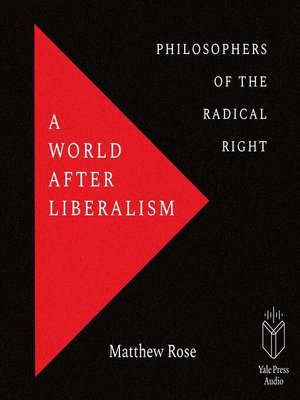
Sign up to save your library
With an OverDrive account, you can save your favorite libraries for at-a-glance information about availability. Find out more about OverDrive accounts.
Find this title in Libby, the library reading app by OverDrive.



Search for a digital library with this title
Title found at these libraries:
| Library Name | Distance |
|---|---|
| Loading... |
,A bracing account of liberalism&rsquo,s most radical critics, introducing one of the most controversial movements of the twentieth century
In this eye-opening book, Matthew Rose introduces us to one of the most controversial intellectual movements of the twentieth century, the &ldquo,radical right,&rdquo, and discusses its adherents&rsquo, different attempts to imagine political societies after the death or decline of liberalism. Questioning democracy&rsquo,s most basic norms and practices, these critics rejected ideas about human equality, minority rights, religious toleration, and cultural pluralism not out of implicit biases, but out of explicit principle. They disagree profoundly on race, religion, economics, and political strategy, but they all agree that a postliberal political life will soon be possible.
,
Focusing on the work of Oswald Spengler, Julius Evola, Francis Parker Yockey, Alain de Benoist, and Samuel Francis, Rose shows how such thinkers are animated by religious aspirations and anxieties that are ultimately in tension with Christian teachings and the secular values those teachings birthed in modernity.
In this eye-opening book, Matthew Rose introduces us to one of the most controversial intellectual movements of the twentieth century, the &ldquo,radical right,&rdquo, and discusses its adherents&rsquo, different attempts to imagine political societies after the death or decline of liberalism. Questioning democracy&rsquo,s most basic norms and practices, these critics rejected ideas about human equality, minority rights, religious toleration, and cultural pluralism not out of implicit biases, but out of explicit principle. They disagree profoundly on race, religion, economics, and political strategy, but they all agree that a postliberal political life will soon be possible.
,
Focusing on the work of Oswald Spengler, Julius Evola, Francis Parker Yockey, Alain de Benoist, and Samuel Francis, Rose shows how such thinkers are animated by religious aspirations and anxieties that are ultimately in tension with Christian teachings and the secular values those teachings birthed in modernity.







